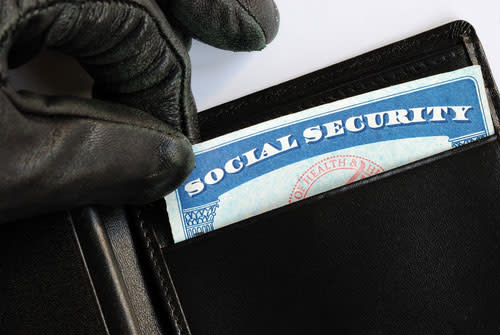What to Do If Your Social Security Number Is Stolen
A Social Security number (SSN) is probably the single most important piece of government-issued identification that a U.S. resident can have. It's definitely the most valuable piece of ID that identity thieves can get their hands on, especially when combined with the bearer's name and address. Even by itself, a valid SSN can be sold to undocumented workers or to people trying to hide their true identities.

(Image: © JohnKwan/Shutterstock)
A stolen SSN lets the thief, or the person he or she sells it to, do almost everything a legitimate SSN holder can do — and more. By assuming a real person's name and SSN, a thief can steal property and money from that person. If an identity-theft victim's name and SSN are used by criminals, it's the victim whom the police will be looking for.
"You can close a credit card if it is compromised," said Adam Dolby, director of channel sales at Minneapolis-based Entrust Datacard. "But the problem is, you can't close your SSN."
MORE: Best Identity-Theft Protection Services
If you discover your Social Security number has been stolen or otherwise misused by another person, there are several steps you'll need to take right away.
— Contact one of the three major credit-reporting agencies — Equifax, TransUnion, or Experian — to place a fraud alert on your credit file. To speak to Equifax, call 1-888-766-0008 or visit this Web page. To contact Experian, call 1-888-397-3742 or go here. For TransUnion, the phone number is 1-800-680-7289 and the link is here. The agency you place a fraud alert with will contact the other two.
Renew the fraud alert every year (it's free to do so) until you're satisfied the matter has been settled; it could take many years. Contact the Social Security Administration only to get a replacement card or replacement number (see below).
— Tell each of the three agencies that your SSN has been stolen. They'll give you free copies of your current credit reports. Review those reports for unfamiliar accounts and unknown inquiries from companies.
— Report the theft of the Social Security number to the IRS at http://www.irs.gov/uac/Identity-Protection. You can also call 1-800-908-4490. That will prevent tax-fraud thieves from filing tax returns in your name — and collecting your tax refund.
— Report the identity theft to the Federal Trade Commission at http://www.idtheft.gov. You can also call 1-877-IDTHEFT.
— File an identity-theft report with your local police. The police report will help clear your records and your name, and the report is necessary to have if you want to apply for a new Social Security number.
— Keep track of, record, report and close all fraudulent accounts by contacting both the companies holding the accounts and the credit-reporting agencies. This will keep your credit as clean as possible. The only way to get a new SSN from the government is to prove without a doubt that someone has used the old number. Records of fraudulent accounts can provide that evidence.
— Report the theft of your Social Security number to the Internet Crime Complaint Center at http://www.ic3.gov/. The report will be distributed to the relevant federal, state and local authorities.
The Federal Trade Commission offers a good resource on what to do in case of identity theft at http://www.consumer.ftc.gov/features/feature-0014-identity-theft.
Whether and how to get a new Social Security number
Many stolen Social Security numbers are used simply to gain employment, with no detrimental effect to the legitimate holders of the SSN. But others are used to defraud banks, retailers, the IRS and other government agencies, which could trash your credit.
MORE: Identity Theft Victim? Here's 6 Things You Need to Do
If several years pass after the theft of your Social Security number, and the problems arising from the theft have not gotten any better, then you may want to apply for a new SSN. But before you take that step, there are several things to consider.
— Getting a new Social Security number is not easy. You have to prove that the theft of your SSN has caused you serious hardship in the form of denied home mortgages, problems with law enforcement or the IRS, or bad credit that can't be cleaned up.
— A new Social Security number doesn't mean the identity-theft problem will go away. The old number will remain valid; you will have to keep monitoring it for future incidents, and government agencies or businesses will still link you to it.
— A new Social Security number will have a completely blank credit history. Getting credit will be difficult for a few years — unless you link it to your old, tainted number.
— It's entirely up to the Social Security Administration to decide whether you can get a new number. If the agency doesn't think you need a new one, you won't get one.
If you do decide to get a new Social Security number, the first step is as easy as filling out a standard SSN application form. You'll enter the old number on it. But be prepared to plead your case, and to have ample documentation to prove it.
Don't forget that the old Social Security number never completely goes away, even if it goes dormant. The Social Security Administration never invalidates an SSN once it's been issued.
PREVIOUSLY: How to Protect Your Social Security Number

